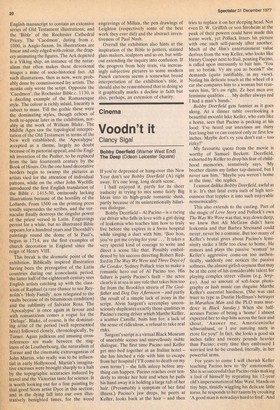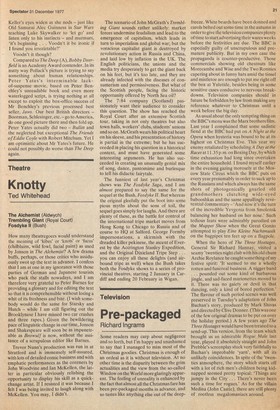Cinema
Voodn't it
Clancy Sigal
Bobby Deerfield (Warner West End) The Deep (Odeon Leicester Square) If you're depressed or hung-over this New Year don't see Bobby Deerfield (A) right away. It's one long, long death scene.
I half enjoyed it, partly for its sheer audacity in trying to mix some fairly Big Ideas into its high-grade romantic slush, partly because of its unintentionally hilarious dialogue.
Bobby Deerfield — Al Pacino — is a racing car driver who falls in love with a girl dying of leukemia who teaches him how to truly live before she expires in a Swiss hospital while singing a duet with him, 'Boo hoo, you've got me crying for your. . It takes a very special kind of courage to write and direct a scene like that. Possibly emboldened by his success directing Robert Redford in The Way We Were and Three Days of the Condor, Sydney Pollack tries to make a romantic hero out of Al Pacino too. His failure is partly Pacino's fault — the actor clearly is at sea in any role that takes him too far from the Brooklyn streets of The Godfather and Dog Day Afternoon — and partly the result of a simple lack of irony in the script. Alvin Sargent's screenplay unconsciously duplicates exactly those qualities in Pacino's racing driver which Marthe Keller, a scattier Camille, baits him for: a lack of the sense of ridiculous, a refusal to take real risks.
Sargent's script is a virtual Black Museum of unactable scenes and marvellously risible dialogue. The first time Pacino and Keller get into bed together at an Italian hotel — she has hitched a ride with him to escape from her hospital ('I'll come to death on my own terms') — she falls asleep before anything can happen. Pacino reaches over tenderly to stroke her hair and when he pulls his hand away it is holding a large tuft of her hair. (Presumably a symptom of her fatal illness.) Pacino's jaw drops, he peers at Keller, looks back at the hair — and then tries to replace it on her sleeping head. Not even D. W. Griffith or yon Stroheim at the peak of their powers could have made this scene work, yet Pollack litters his picture with one such self-parody after another. Much of the film's entertainment value derives from the way Keller, who looks like Henry Cooper next to frail, pouting Pacino, is called upon incessantly to bait him. 'You are so borink. Vy are you zo borink?' she demands (quite justifiably, in my view). Noting his delicate touch at the wheel of a car she compares him to a woman but reassures him, 'It's aw right. Ze best men ave feminine qualities. . . My doffer always zed I had a man's hands.'
Bobby Deerfield gets funnier as it goes along. At a dinner table overlooking a beautiful moonlit lake Keller, who eats like a horse, sees that Pacino is pecking at his food: 'I've heard our intextines are thirty feet long but ye can control only ze first few inches. Maybe dot's vy you don't eat — too rizky?'
My favourite quote from the movie is worthy of Samuel Beckett. Deerfield, exhorted by Keller to drop his fear of childhood memories, tentatively says, 'My brother claims my father tap-danced, but I never saw him.' Maybe you weren't home at the time,' she replies.
I cannot dislike Bobby Deerfield, awful as it is. It's that fatal extra inch of high seriousness that topples it into such enjoyable nonsensicality.
This also extends to the casting. Part of the magic of Love Story and Pollack's own The Way We Were was that, way down deep, we knew that Ali McGraw didn't have leukemia and that Barbra Streisand could never, never be a commie. -But too many of Keller's brutal gives about Pacino's femininity strike a little too close to home. He minces and plays the passive 'woman' to Keller's aggressive come-on too authentically; suddenly one notices the passive softness, the almost girlish coyness that may be at the core of his considerable talent for playing complex street villains (e.g. Serpico). And no amount of soft-focus photography or lush music can disguise Marthe Keller's essential hardness. (She was cast truer to type as Dustin Hoffman's betrayer in Marathon Man and the PLO mass murderer in Black Sunday.) When she half accuses Pacino of being a 'homo' I almost expected her to slap him across the face and shout, 'Answer me, Americanische schweinhund, or 1 ave zumzing nazty in ztore for you!' In fact, she looks a good six inches taller and twenty pounds heavier than Pacino; every time they embraced I worried lest he be crushed, literally, in her powerful arms.
For years to come I will 'cherish Keller teaching Pacino how to 'fly' emotionally.
She is so successful that Pacino risks making a fool of himself by repeating his 127year old's impersonation of Mae West. Hands on tiny hips, timidly wiggling his delicate little torso, he responds to her taunts by croaking 'A good man is nowadays hard to find'. And Keller's eyes widen as she nods — just like Old Samurai Alec Guinness in Star Wars teaching Luke Skywalker to 'let go' and listen only to his instincts •-and murmurs, 'it's beginning . . . Voodn't it be ironic if I found you irreziztable?'
Voodn't it though?
Compared to The Deep (A), Bobby Deerfield is an Academy Award contender. In its nutty way Pollack's picture is trying to say something about human relationships. Peter Yates's interminable lackof-suspense movie, based on Peter Benchley's unreadable book and even more waterlogged script, is trying nothing at all except to exploit the box-office success of Mr Benchley's previous processed best seller, Jaws. OUT best British directors — Boorman, Schlesinger, etc.—go to America, do one good picture there and then fold up. Peter Yates actually did two — Bullitt and the neglected but exceptional The Friends of Eddie Coyle with Robert Mitchum. Yet I am optimistic about Mr Yates's future. He ' could not possibly do worse than The Deep again.







































 Previous page
Previous page